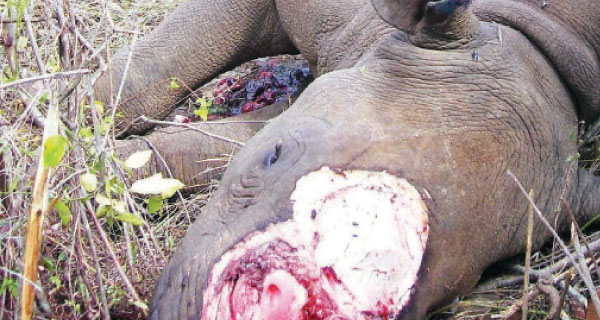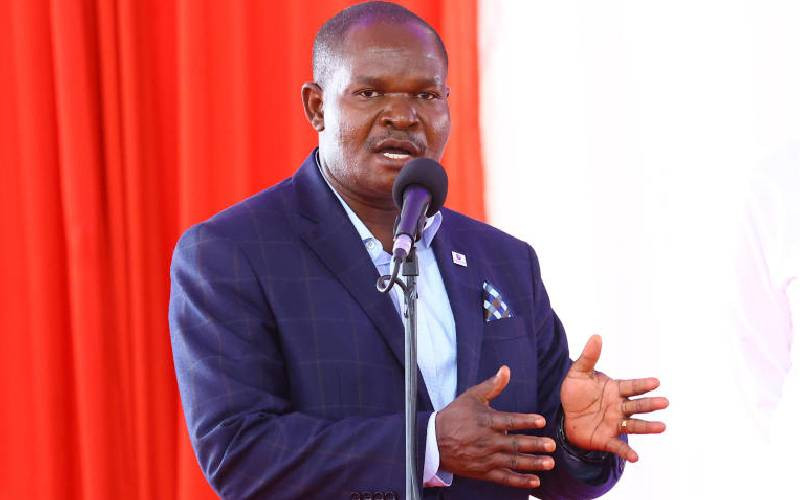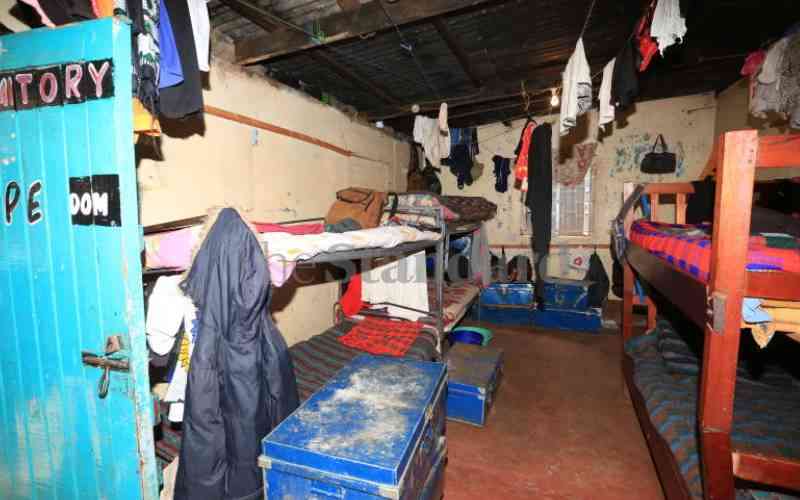 |
|
Dead Rhino |
By KIBIWOTT KOROSS
[email protected]
The planned recruitment of 1,000 game rangers to beef up the war against poaching hangs in the balance amid reports of a funding gap. The Kenya Wildlife Service (KWS), which has been hit by an upsurge in poaching mainly targeting elephants for their ivory, was to recruit 500 rangers in July and another 500 next year. This is still on course according to KWS Director William Kiprono and Judi Wakhungu, the Cabinet Secretary for Environment Water and Natural Resources.
However, a well-placed government source privy to recent communications between the ministry and KWS said the plan had been shelved owing to a shortage of funds, placing in further jeopardy the fight against armed poachers who have killed 45 rhinos and 183 elephants since the beginning of the year.
A recent census by KWS reported a steady rise in elephant numbers in Amboseli ecosystem despite high cases of poaching reported in the area. Currently, there are 2,800 rangers distributed to over 58 National Parks and Reserves nationwide that, according to KWS, are not enough.
Nearly half of them perform office duties bringing the number to those carrying out patrols and security surveillance to less than 2,000 at any particular time with some being off duty or on leave.
Speaking to The Standard On Saturday on phone, Ms Wakhungu agreed there had been a delay in release of funds for the exercise, but insisted it would be rolled out soon.
She said: “Yes there was a hitch but it is being sorted now. As we speak, we are going to advertise soon. As we speak, I am waiting a communication from the director’s office on the same.”
She said the exercise will be carried out on due course. “We are starting with the NYS and later we will roll a national exercise,” she said.
The KWS director also expressed optimism in a telephone interview with The Standard On Saturday: “We had planned to recruit 500 rangers in July this year while the rest next year and this has not changed.
“Some parks like Tsavo are so large. We require more rangers here,” said Kiprono.
Tsavo covers more than 12,000 kilometres, 40 per cent of Kenya’s parks’ total area and is one of the world’s wildlife and biodiversity strongholds. Thirty-two KWS rangers were suspended following persistent poaching and five officers killed by poachers are yet to be replaced. The officers were accused of colluding with poachers to kill elephants and rhinos for trophies.
Those interdicted are a senior warden, company commanders, platoon commanders and several rangers. Two months ago gunmen shot dead a white rhino in Nairobi’s national park, one of the best guarded. Sources at KWS pointed fingers at the dismissed officers.
Intimidation to security
“This was actually an intimidation to KWS security. It was not a case of poaching but a way of telling them we can do it (poach) right at your door,” said a security officer based at the headquarters. The poachers hacked out the horn from its head and escaped.
Stay informed. Subscribe to our newsletter
The whereabouts of the officers are unclear, with claims they could be the ones behind the spate of soaring poaching.
Most of the affected officers were from Tsavo National Park where at least 55 elephants have been killed since January.
The last time KWS recruited rangers was two years ago when 500 were enlisted nationally but sources say only about 430 completed the nine month paramilitary training in Manyani.
“Some (recruits) were returned back on medical grounds. Only 450 were trained,” said an officer based in Manyani training camp.
This is bad news to the wildlife sector, especially after the many elephants and the rhinos poached in the recent months.
Still, rangers attached to the rhino squad who are on a 24-hour service could be fatigued as some are yet to take their annul leave. They include officers based in Lake Nakuru and Tsavo National parks.
Salisha Chandra of Kenyans United Against Poaching, a consortium of community groups protesting against poaching said it was worrying that the government had kept quiet over the issue.
“I am worried by the silence. There is a problem with ranger numbers and this has to be addressed urgently,” she said on phone.
Paula Kahumbu of WildlifeDirect, said there is need to increase the number of rangers since poachers seem to have mastered their movements.
She said: “The poaching levels in the country are alarming. The government should adequately invest KWS in terms of personnel and law enforcement. We need more rangers but we should be ready to equip them and pay them good salaries.”
And with the number of rangers dropping, there are fears that poachers have capitalised with elephant deaths being recorded occasionally in many conservation areas across the country.
Marauding poachers in late September killed an elephant and made away with its tusks near Masai Mara Game Reserve. The male elephant was killed at Nyakwere Forest in Transmara.
Jonathan Kirui, the KWS Central Rift Assistant Director said an unknown number of poachers waylaid and killed the lone jumbo and plucked its tusks using a power saw.
“We are pursuing the poachers who escaped moments after the incident. KWS has enlisted the support of various agencies in the hunt for the poachers,” said Mr Kirui, who added that incidents of poaching within Central Rift have gone down.
Lack of enough personnel has been cited as a factor that has contributed to poaching. “Take a case of Tsavo, a large park with a few rangers coupled other problems like immobility,” Chandra said, adding that, “Most of these parks don’t have vehicles, and have between five and 10 rangers only, which will make it hard for them to counter poaching that has turned into a sophisticated syndicate.”
In the beginning of the year, a gang of 10 poachers is slaughtered and carted off ivory from a family of elephants at the remote Bisadi area near Ithumba in north of the Tsavo East National Park.
One of the discovered carcasses belongs to a juvenile elephant estimated at two months of age. All the carcasses had bullet wounds. Amboseli ecosystem has the largest concentration of elephants in the country where cases of poaching have been reported mostly. “It will be useless to have an elephant population rising without increasing their protective measures,” said Paula, a point KWS Director William Kiprono agrees.
Two months ago, a 120 squad drawn from the General Service Unit, regular police and administration police was set up to counter poaching.
Pay well
The number is minimal compared to the large size of parks in the country, but the numbers are less compared to the large size of operations they are expected to perform.
And with only a meagre Sh15,000 gross pay and a house allowance of Sh2500, the rangers are also easily compromised by ivory and rhino horn traffickers who according to her have a lot of money.
“We need to pay the rangers well if we expect them to offer better security to our wildlife,” said Paula.
She added: “Poaching involves people with money and with little pay, our rangers may be corrupted by the same individuals.”
 The Standard Group Plc is a
multi-media organization with investments in media platforms spanning newspaper
print operations, television, radio broadcasting, digital and online services. The
Standard Group is recognized as a leading multi-media house in Kenya with a key
influence in matters of national and international interest.
The Standard Group Plc is a
multi-media organization with investments in media platforms spanning newspaper
print operations, television, radio broadcasting, digital and online services. The
Standard Group is recognized as a leading multi-media house in Kenya with a key
influence in matters of national and international interest.
 The Standard Group Plc is a
multi-media organization with investments in media platforms spanning newspaper
print operations, television, radio broadcasting, digital and online services. The
Standard Group is recognized as a leading multi-media house in Kenya with a key
influence in matters of national and international interest.
The Standard Group Plc is a
multi-media organization with investments in media platforms spanning newspaper
print operations, television, radio broadcasting, digital and online services. The
Standard Group is recognized as a leading multi-media house in Kenya with a key
influence in matters of national and international interest.








